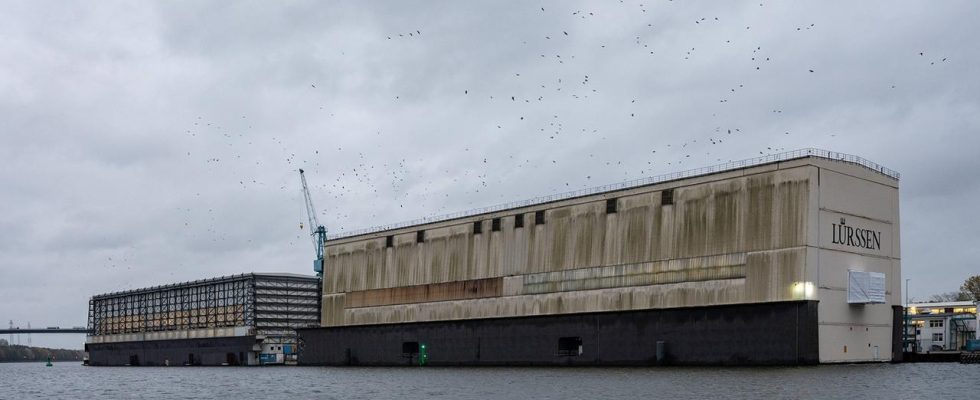exclusive
Despite warnings from the Federal Audit Office, the federal government awarded a controversial order for three ships to a Bremen shipyard. After research by WDR, NDR and “SZ” the construction should now become more expensive by almost 800 million euros.
When the gas from the craters of the Nord Stream 1 and 2 pipelines gushed into the Baltic Sea, then Defense Minister Christine Lambrecht (SPD) made a statement to the press: The damage to the pipelines shows how important a strong navy is for the security of the country. With this in mind, the Bundeswehr is pushing ahead with the modernization of the navy, including the construction of fleet service boats – another word for spy ships.
In fact, the Department of Defense commissioned the construction of such reconnaissance ships last summer. The warships are said to be equipped with the latest espionage technology, listening systems, radars and other sensors, the first of which is scheduled to set sail from 2026 – in order to be able to record which foreign submarines are moving in the depths of the waters and to intercept communications.
Chaotic implementation
But as militarily useful as the new spy ships may be, the implementation of the order worth billions, which went to the Bremen shipyard “Naval-Vessels-Lürssen” (NVL) last summer, has been chaotic so far. Shortly before the federal elections in 2021, the parliament had awarded the contract with a volume of around two billion euros and largely refrained from making specific specifications as to what exactly should be covered by the scope of services.
A concrete construction specification, for example, was initially dispensed with. At the time, it was important to the MPs that the gigantic armaments project got under way. Since then, there has been a dispute behind the scenes about the structure of the contract.
680 million euros additional costs – net
After research by WDR, NDR and “Süddeutsche Zeitung” there is now a recalculation with a massive cost explosion: While the armaments project was already well equipped with an order volume of around two billion euros, the manufacturers are now assuming additional costs of around 680 million euros – plus VAT . Overall, this could result in additional costs of almost 800 million euros for the tax fund. The reason for this should be general cost increases due to inflation, but also adjustments to the order.
A cost increase of 800 million euros? With a contract that actually provided for a fixed price? The Federal Ministry of Defence, now under the leadership of Boris Pistorius (SPD), does not want to explain this on request and refers to the Koblenz Federal Office for Procurement (BAAINBw). From there it says: “The ongoing procedure can only be completed with a new parliamentary referral.” Questions about the additional costs can therefore not be answered. The NVL shipyard left an inquiry unanswered.
Federal Audit Office warned early
The cost explosion is not unexpected. Already reported in January WDR, NDR and “SZ” for the first time that the Federal Audit Office had raised “considerable” concerns about the award of the billion dollar deal. The independent auditors regularly check for cost-effectiveness and legality in such billion-euro contracts from the federal government.
In the case of the spy ship award, the inspectors were particularly bothered by the contract structure. The deal with “Naval-Vessels-Lürssen” was set up in such a way that a “construction specification” should only be drawn up after the contract had been concluded. In other words: Only after the order had already been placed did the federal government want to work out together with the shipyard exactly how the ships should be built. A billion award virtually flying blind. The Federal Audit Office feared “additional expenditure in the medium term”.
expert criticized cost development
In the meantime, the federal government hired Professor Stefan Krüger from the TU Hamburg to have the outstanding construction specification drawn up. When asked, he was amazed at the exploding costs: “We were commissioned by the federal government to make a new design for the fleet service boats. We then significantly revised the original design together with the BAAINBw and the shipyard. In my opinion, they can Boats in the shipbuilding sector will by no means become more expensive as a result of these changes, because the boats now meet all technical requirements with significantly less effort, for example by reducing the drive power and fewer departments. Actually, the boats should have become cheaper from a technical point of view.”
budget committee now have to agree again
When asked, the Ministry of Defense and the Koblenz procurement office did not explain in which specific areas the additional costs now calculated by the manufacturer were incurred. Normally, additional claims have to be checked by the procurement office and then approved by the budget committee of the Bundestag.
The parliamentarians could still pull the ripcord: Due to the massive cost increases, they could also refuse approval. Not an easy undertaking, because from the point of view of the military there is time pressure. In addition, there has been a crisis between the Federal Ministry of Defense and the Budget Committee for a long time. Individual MPs also feel that they are not sufficiently informed about other projects and have recently formulated budgetary freezes or so-called stipulations. In such cases, the federal government must then explain exactly how the development of certain armaments projects is progressing.
In order to forestall this, the MPs involved in the coalition factions should, according to information from WDR, NDR and “SZ” will first be informed in a confidential meeting on Wednesday.

